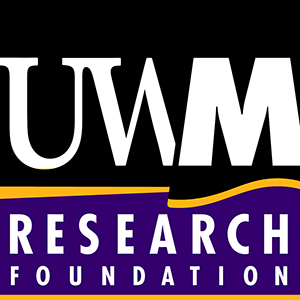SUPPORTING UWM’S ENTREPRENEURS & THEIR VENTURES
AWARDED
FOLLOW-ON FUNDING
The Bridge Grant Program is aimed at providing essential “bridge” or “gap” funding to startups that have advanced beyond basic government-funded research and are transitioning toward commercialization. Open to faculty, staff, students, and startups across all disciplines, the program seeks to foster the creation of new ventures at UWM. By supporting these startups, the Bridge Grant Program contributes to improving Wisconsin’s economy, creating jobs, attracting talented researchers and students, enhancing local products and services, and positively impacting society as a whole.
UWM is home to a diverse community of researchers engaged in various fields of discovery, and the commercialization outcomes vary based on technology and stage of research. Regardless of the specifics, all projects share a common thread: the dedication and creativity of UWM faculty, students, and staff. The Bridge Grant Program strategically focuses on areas where UWM can have the most significant impact, particularly in science and engineering, helping startups navigate the challenges they face and drive economic growth in Wisconsin.
EARLY STAGE STARTUPS
NEW JOBS CREATED
UWM Entrepreneurs
The UWM Research Foundation invites proposals for the Bridge Grant Program. Awards range from $5,000 to $25,000, with a funding period of one year, and can support various stages, including translational research, proof of concept, startup formation, and growth.
To be eligible, projects must be directly related to active intellectual property owned by the UWM Research Foundation. This includes invention disclosures, active patent applications, issued patents, or active copyrights. Proposals will be evaluated by industry reviewers, with a strong emphasis on the business case and a solid go-to-market plan. All types of startup products or services are eligible for funding, with the primary objective being the development of commercially viable projects.
Thank you to our Donors
Generous contributions from Bader Philanthropies, Clarios Corporation, members of the UWM Research Foundation Board of Directors, and UWMRF itself have provided essential early-stage funding for promising UWM startup companies. Through a 1:1 Capital Catalyst matching grant awarded by the WEDC, these donors have helped create opportunities for young companies to overcome early funding challenges, positioning them for future investment and growth. This support not only strengthens these startups but also bolsters economic development in Milwaukee and Wisconsin.
MORE DETAILS + HOW TO APPLY
Focus Areas
Any start-up product/service type is eligible for funding. The Bridge Grant Program will make “Gap Fund” awards to foster development of projects further along the continuum toward commercialization.
Process
Full proposals will be reviewed by a selection committee of five members. The committee will include judges such as angel investors, venture capital investors, serial entrepreneurs, business development leaders in industry, or senior research leaders in industry. Each application will be scored.
Timeline
Example Timeline (Depends on funding match)
- 4/7/2025: Call for proposals
- 05/12/25: Deadline for full proposals – by 5:00 PM
- 06/02/2025: Scientific review of full proposals
- 06/06/2025: Target for notification of awards
- 06/30/2025: Target beginning of award period
Evaluation Criteria
Qualification Criteria:
- Applicant must be formed/registered LLC or corporation
- Applicant must have intellectual property owned by UWMRF, a license or option agreement in place with UWMRF, UWMRF holds an equity share in the company, or submit a new invention disclosure for consideration
- UWM team member (employee or student) must be part of the start-up or must have licensed IP from UWMRF; proof of affiliation
- Strength of the team and their advisors
- Must have completed a customer discovery program such as I-Corps, UWM Student Startup Challenge, or Ideadvance or commit to participate in such a program in the year of funding in order to qualify
- Solid description of the business case/technology
- Description of any intellectual property
- Go to market plan
- Quality of the opportunity and competitive advantage
- Specific milestones to be selected for advancement using the grant funding (one or more)
- Exit plan if applicable
- Description of partnerships planned or needed
- Applicants must have raised an aggregate of less than $5M as a formed company from investments or commercialization type grants such as SBIR/STTR
Eligible Costs: Applicants are expected to justify their funding requests based on specific milestones to be reached. Eligible expenses can include, but are not limited to:
- Business services
- Software Developer Service Fee
- Business filing fees
- Market research reports helping you to strategize assumptions to test
- Market research (focus groups; surveys; etc.)
- Travel expenses especially for conferences and customer discovery calls
- Development /Project Management Tools
- Legal/Accounting expenses
- Office/lab rent
- Subscription to data services
- Web/hosting services
- Analytic tools
- Prototype or minimum viable product (MVP) development
- Training and education
- Beta testing/free trials
Ineligible expenses include:
- Basic research support
- Fringe benefits
Investor Evaluation Criteria for Gap Fund Applications: Reviewers will be asked to rank the proposals based on the following criteria:
- Alignment of milestones to Bridge Fund mission and eligibility
- Quality of market opportunity and competitive advantage
- Strength of team to move forward
- Impact of milestones to advance commercialization efforts and reduce risk
- Impact of the proposed use of funds
- Overall likelihood that the product will offer a significant and competitive advantage to customers
Questions?
Confirmation: You should receive a confirmation that your proposal has been received within one business day of submitting it. If you do not receive a confirmation email, please contact the UWM Research Foundation immediately.
Questions should be directed to the UWM Research Foundation: Jessica Silvaggi, jessica@uwmrf.org, 414-906-4654.

